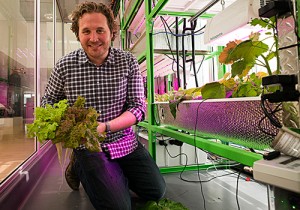Podcast: Food for Thought - What's New in Food Science?
-
-
slice.mit.edu
Filed Under
Recommended
MIT has a long history with food, from nutrition science to environmental costs, and today food innovation projects at MIT run the gamut. MIT’s newest food initiative, Abdul Latif Jameel World Water and Food Security Lab (JWAFS) is bringing together research across disciplines.
Learn more about JWAFS and food projects at MIT in the Slice of MIT podcast, Food for Thought. This episode focuses on four things: an Institute-wide food and water security lab; a Media Lab Agriculture Initiative; a chemistry sensor project that can detect spoiling meat; and an alumnus chef that uses science to perfect his recipes.
(Read the episode transcript.)
This podcast is being released a few days before Thanksgiving 2015, so of course, we needed to address the Thanksgiving meal. Kenji Lopez-Alt ’02, culinary director of Serious Eats—a renowned food blog, offers insight into cooking with science and weighs in on the persistent Thanksgiving turkey question, to brine or not to brine?
Renee Robins ’83, executive director for JWAFS, talks about the growth of food and water projects at MIT and the promising technologies that are coming from interdisciplinary collaborations.

One promising research project is the Open Agriculture Initiative, run by Caleb Harper March ’14 in the Media Lab. Harper discusses his research that uses alternative growing methods, like aeroponics and hydroponics, along with LED lights, and controlled climate—all harnessed by open-source technology. He hopes his work can become the foundation for a new method of agricultural production to help produce food that can be eaten closer to the point of growing and to grow anything, anywhere in the world with similar technology and the right climate recipe.
Jan Schnorr ’12 was working toward completing his PhD in Tim Swager’s lab in the chemistry department when he started C2Sense, a startup that is developing sensors that can detect food spoilage and therefore help reduce food waste. “We had a project around ethylene detection, which is very relevant for fruit freshness,” says Schorr. There are several types of low-cost sensors being developed to monitor fruit and meat ripeness, indicating if the food has gone bad. These sensors could help at all steps in the supply chain—in distribution and storage, in grocery stores, and at home in refrigerators.
Listen to podcast and visit the Alumni Association’s SoundCloud page. Don’t forget to subscribe on iTunes and rate the podcast and leave a review. Tweet your thoughts on this episode to @mit_alumni.







